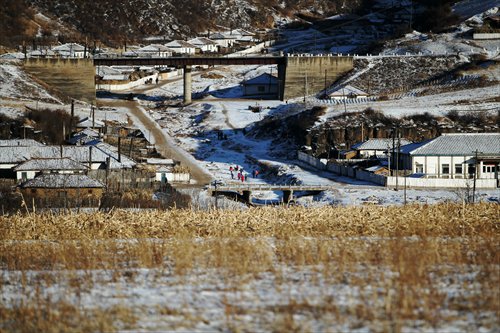

A barbed wire fence that runs along China's border with North Korea on January 15 in Yanbian Korean Autonomous Prefecture, Northeast China's Jilin Province Cui Meng/GT
Residents of towns near China's border with North Korea regularly see their foreign neighbors across the Tumen River that separates the two countries. Most of the people who live in these towns are seniors and children of Korean ethnicity as the young adults have mostly moved away. Following a recent incident in which a North Korean soldier crossed the border and committed a robbery, killing two elderly couples in the process, the security of these people living on the edge of the country has been an issue of some discussion.
Any resident you talk to in the border towns of the Yanbian Korean Autonomous Prefecture in Jilin Province can remember encountering North Koreans. They tell stories of running into North Korean truck drivers in restaurants, meeting North Korean children while swimming in the Tumen River on the border, or in some cases, helping deserters who had fled to China.
In recent years however, locals have also started to tell stories of robberies, and even murders.
On December 27, 2014, a North Korean soldier went to a village in Helong, Yanbian prefecture and killed two elderly couples in the course of a robbery. The soldier was later shot dead by Chinese border police. This incident highlighted the issue of the security of Chinese towns near the North Korean border.
This is far from an isolated incident. In recent years there have been several cases of North Koreans coming across the border and committing crimes. At the same time, these border towns are becoming more vulnerable as young adults leave to find work in cities, leaving the elderly and children behind.
The aftermath of the shooting
Jidi village in Nanping township, the scene of the recent shooting, has about 60 residents. They are mostly old people, whose children have left the area to work in South Korea.
Xu Chengzhe, the son of one of the murdered couples, told ifeng.com that his father "was shot in the head and lost one eye." He said that their room was riddled with bullet holes.
Xu Shanji, Xu Chengzhe's sister, told ifeng.com that they hope the government will give them compensation. Her brother is unmarried and they have an 80-year-old grandmother to care for. Since the incident, they have visited the local government repeatedly but have not received any response to their requests.
Following the shooting, security along the border has been tight. A taxi driver who drives between Helong and nearby towns, who gave his surname as Zhang, said the village is deserted now. The residents have moved to live with their children or gone to their relatives' houses in town. Now, police are the only people in the village.
"Of course they are afraid," he said. "What matters more than your life?"
The local police have set up more security checkpoints on the roads leading to some border towns, stopping every car that comes past and checking the passengers' ID cards.
Dangerous neighbors
In September 2014, a North Korean came into Yanbian prefecture's Nanping town at night and killed Li Chunfeng, his wife, and their 26-year-old son, the Beijing News reported.
Li's son-in-law, surnamed Yong, told the newspaper that the North Korean pried open the window and killed them with a hammer. The local police later gave Yong two cellphones, 500 yuan ($80) and a handbag that the criminal had stolen from his in-laws. The criminal was caught by a North Korean border patrol as he tried to sneak back into North Korea.
These types of encounters take place frequently in many border towns, villagers told the Global Times, but they do not always involve violence.
The town of Sanhe, about 100 kilometers east of Helong, used to be a flourishing community of about 2,000 people, but now that number has waned to about 500, mostly seniors and children. When the Global Times visited one afternoon, the streets were empty. A few locals were congregated in an activity room at the edge of the town, playing mahjong.
The town is directly across the Tumen River from the North Korean town of Hoeryong. If one climbs on a nearby hill the town is clearly visible, as is a border crossing where trucks line up to carry goods from China into North Korea and vice versa.
Jin Yunhe, whose grandfather came from the Korean Peninsula to Sanhe before the founding of the People's Republic of China in 1949, has lived in the town all his life. The 71-year-old man used to work at the local forest farm and became the head of the local Senior Citizen Society after he retired.
He remembers that a few years ago, a North Korean came to Sanhe to burgle houses. That person tied an old couple to a chair and robbed them of everything he could take. The old couple eventually froze to death, as Jilin is bitterly cold in winter.
Copyright ©1999-2018
Chinanews.com. All rights reserved.
Reproduction in whole or in part without permission is prohibited.